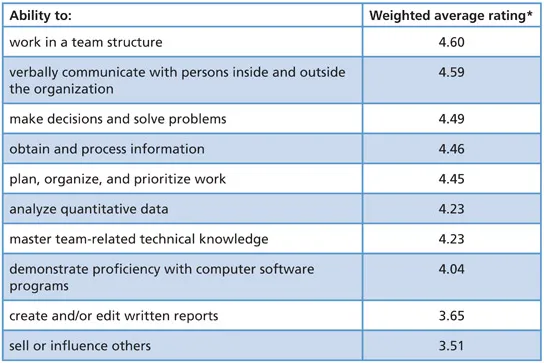Team Management and Why It Matters
Most of us have participated in teams whether it was working at a summer job in college, on a painting crew, or as a server in a restaurant; doing volunteer work; or taking on summer internships while in college. And of course, most of us have been part of many group projects throughout our college careers. Some of these experiences may have been positive, but others may have been characterized by loafing on the part of some team members, leaving you to do a large part of the project on your own, personality conflicts in deciding how to complete a project, and challenges associated with trying to schedule meetings and coordinate project completion.
Because most of us have had at least some experience working in teams, there is a tendency to feel that we already know everything there is to know about working in and leading teams in a professional work environment. There is also a tendency to believe that obtaining a good GPA is all we need to do to prepare ourselves for a successful job and career after graduation. Further, we may fear that working in teams can put our GPA at risk since our grade depends on the contributions of others who may not be as motivated or as capable of contributing to the creation of a team project that will earn an “A.”
In reality, the ability to work in a team will be critical for your career success. Moreover, a lack of teamwork skills can potentially derail your career. Consider the case of Steve Sinofsky, the architect of Microsoft’s Windows 8 operating system, who abruptly left the company in November 2012 shortly after the product’s release. While many in the company viewed Sinofsky as a brilliant technician, his reputation for being abrasive and noncollaborating undermined his chances of being considered as a candidate for CEO.1
Working in teams in organizations can vary in many ways. For example, consider the following team situations from individuals’ actual experiences and think about how you would handle them as a team leader:
I was the member of a team in which I had a very different perspective of how to get things done with another team member. This led to arguments between us about nearly [every] aspect of the project. Meanwhile, other members of the team were either apathetic or unwilling to speak up and take a side on issues because they did not want to rock the boat. The individual with whom I was having issues with sent e-mails to other members of the team alleging that I was pushy and not a team player.
I worked for a car dealership doing detail work and new vehicle prep and the teams were extremely ineffective. We would receive orders/instruction from two owners, the service manager, and technicians, all of whom had different demands and expectations. Along with poor communication, there was also poor follow-up and evaluation of the team’s work.
I was a part of a team when I worked at a YMCA summer camp in Minnesota. We were charged with the task of creating a skit for the whole camp. My group consisted of many people who were unlike each other, and our group lacked cohesiveness. The group had no icebreaking activities, and it was evident that group members felt awkward contributing in front of others.
I was on a team that was supposed to create a marketing plan for a company. The other members of the team did not care about the project so they did not respond to e-mails or voice mail messages to set up meetings, and they either did not complete their assigned work on time or they turned in work that was unacceptable. About a week before the deadline for the project, the other four members of the team basically bailed out on me and left the completion of the project for me to do on my own.
I was on the executive board for a student organization. Our team mostly communicated via e-mail. Roles and assigned duties were not established, so sometimes things weren’t addressed ahead of time. Deadlines that were set for team members were not properly enforced, and many protocols that seemed like common sense weren’t established, so the exec team wasn’t as efficient as it could have been.
These scenarios show there are no quick or easy solutions to the kinds of team problems you are likely to encounter in your job.
TEAMS IN THE NEWS: “Google Management Award Winner Learns How to Keep a Team Together” This article describes how Farzad “Fuzzy” Khosrowshahi, an award-winning project leader at Google, devotes a significant amount of time to the development of a strong team. Why does he do this? The reason is that engineers at Google can switch between projects at their discretion. This makes it critical for Farzad to develop and manage a project team that engages team members and motivates them to want to remain with the team in the future. Team development is also important in order for Farzad to recruit the best and brightest people to join his project team in the future. What does Farzad do to enhance his effectiveness as a team leader? First, he gives his team members 2 weeks a year to pursue any projects in which they are interested. He also has developed key skills that enable him to communicate effectively with his team members, including how to negotiate, how to give feedback, and how to deal with performance issues.
Source: J. Walker, “Google Management Award Winner Learns How to Keep a Team Together,” Wall Street Journal, July 4, 2012. http://professional.wsj.com/article/SB10001424052702303410404577466881997151146.html.
Recent research shows that teamwork skills are critical for an individual’s future job success. The 2012 Job Outlook survey conducted by the National Association of Colleges and Employers (NACE) identified the qualities that employers value most in college graduates. The ability to work in a team was ranked as the number one quality, with nearly 80% of employers indicating that they value this attribute when hiring. Figure 1-1 shows a partial listing of other highly rated qualities.
Figure 1-1 Qualities That Employers Seek on a Job Candidate’s Resume 1
In addition, most business professionals who have relevant experience feel that working in teams is not only part of their jobs but also critical for their career success. The interviews with two business professionals profiled in this chapter offer thoughts about the importance of teamwork and advice for developing effective team management skills. The first interview is with Cody Candee, a recent college graduate who was a strong leader during his time as an undergraduate business student. The second interview featured later in this chapter is with Al Johnson, a more experienced business professional.
Team Management Coach
Insights and Advice
Cody Candee, Finance Leadership Rotational Program, Intuit
We all know that many college students dislike working in teams in class projects. What would you like to say to current students about the importance of learning how to work in a team?
Working in teams is an inevitable part of life. When you’re in the work force, you’d better be ready for it. Nearly every employer in a job interview will assess your teamwork skills and ask you questions like “Tell me about a time when you had to work with others towards a shared goal” or “Tell me about a time when you overcame a disagreement with a team member.” When interviewing, you are going to want as many examples as you can to demonstrate your team working abilities. You’ll be constantly working with people in your job, and employers want to know that you’ve learned how to handle different scenarios.
Which specific experiences did you have during your college years that were the most helpful in enabling you to learn how to develop and lead a team effectively?
In college, I was involved in various student organization leadership roles that really proved valuable for developing team leadership skills. I would say I learned more from these nonclassroom experiences than anything else in college. I was very active in Delta Sigma Pi professional business fraternity with roles of president, chancellor, and vice president of chapter development. Being in a role where I had to lead others helped me develop various skills such as public speakin...






